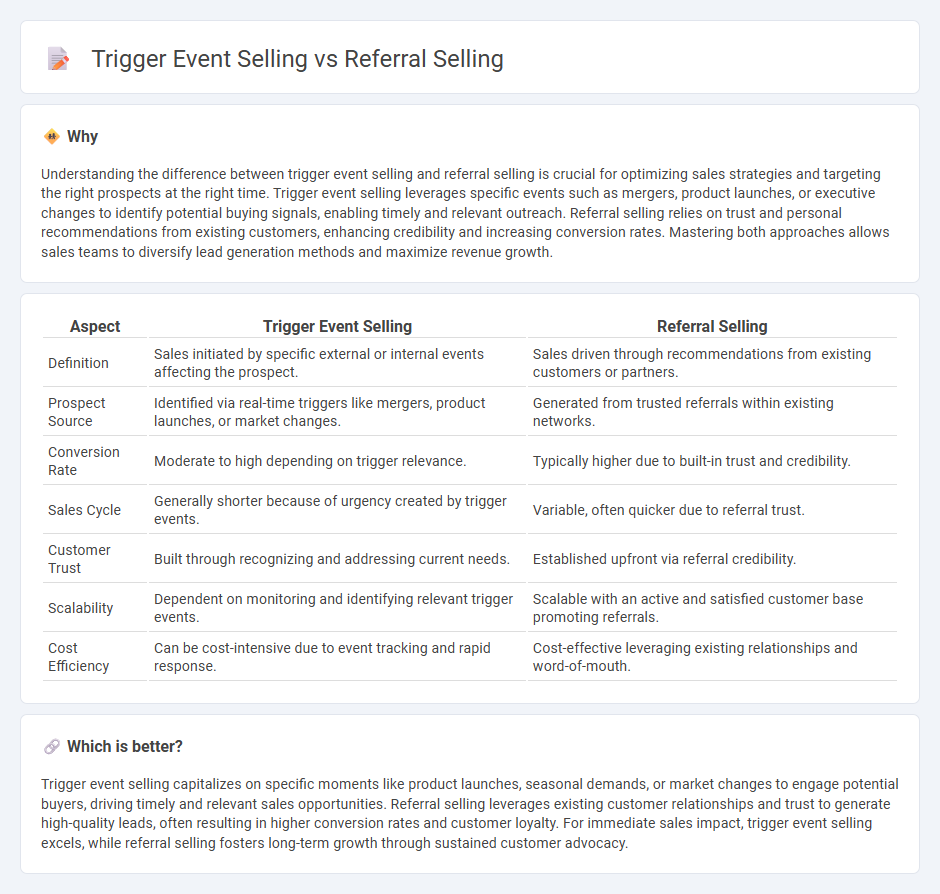
Trigger event selling capitalizes on specific occurrences such as mergers, product launches, or leadership changes to initiate timely sales conversations. Referral selling leverages existing customer relationships and trust, encouraging satisfied clients to recommend products or services to potential buyers. Discover how mastering both methods can amplify your sales strategy effectively.
Why it is important
Understanding the difference between trigger event selling and referral selling is crucial for optimizing sales strategies and targeting the right prospects at the right time. Trigger event selling leverages specific events such as mergers, product launches, or executive changes to identify potential buying signals, enabling timely and relevant outreach. Referral selling relies on trust and personal recommendations from existing customers, enhancing credibility and increasing conversion rates. Mastering both approaches allows sales teams to diversify lead generation methods and maximize revenue growth.
Comparison Table
| Aspect | Trigger Event Selling | Referral Selling |
|---|---|---|
| Definition | Sales initiated by specific external or internal events affecting the prospect. | Sales driven through recommendations from existing customers or partners. |
| Prospect Source | Identified via real-time triggers like mergers, product launches, or market changes. | Generated from trusted referrals within existing networks. |
| Conversion Rate | Moderate to high depending on trigger relevance. | Typically higher due to built-in trust and credibility. |
| Sales Cycle | Generally shorter because of urgency created by trigger events. | Variable, often quicker due to referral trust. |
| Customer Trust | Built through recognizing and addressing current needs. | Established upfront via referral credibility. |
| Scalability | Dependent on monitoring and identifying relevant trigger events. | Scalable with an active and satisfied customer base promoting referrals. |
| Cost Efficiency | Can be cost-intensive due to event tracking and rapid response. | Cost-effective leveraging existing relationships and word-of-mouth. |
Which is better?
Trigger event selling capitalizes on specific moments like product launches, seasonal demands, or market changes to engage potential buyers, driving timely and relevant sales opportunities. Referral selling leverages existing customer relationships and trust to generate high-quality leads, often resulting in higher conversion rates and customer loyalty. For immediate sales impact, trigger event selling excels, while referral selling fosters long-term growth through sustained customer advocacy.
Connection
Trigger event selling leverages specific customer actions or life changes, such as purchasing a new home or launching a business, to initiate timely sales conversations. Referral selling capitalizes on satisfied customers from these trigger events who recommend products or services to their network, amplifying sales opportunities. Both strategies enhance customer engagement and increase conversion rates by targeting prospects at critical moments with personalized outreach.
Key Terms
**Referral Selling:**
Referral selling leverages satisfied customers to introduce new prospects, enhancing trust and shortening sales cycles by capitalizing on established relationships. It improves conversion rates by targeting warm leads already familiar with the brand or product through recommendations. Explore strategies to maximize referral selling effectiveness and boost revenue growth.
Trust
Referral selling leverages existing customer trust to attract new clients through personal recommendations, enhancing credibility and reducing sales friction. Trigger event selling capitalizes on timely, relevant events to initiate conversations when potential clients are most receptive, building trust through context-aware engagement. Explore how integrating trust into these approaches can optimize your sales strategy.
Network
Referral selling leverages existing relationships within a network to generate warm leads and build trust quickly through personal endorsements. Trigger event selling capitalizes on specific life or business events that indicate a timely need, allowing sellers to proactively engage prospects at critical moments. Explore how optimizing your network for both strategies can maximize sales opportunities.
Source and External Links
What is Referral Selling - Referral selling is a practice where a business offers a discount, rebate, commission, or other benefits to a customer for providing details of potential new customers, with the condition that both the referrer and the referrals make a purchase; this practice is illegal in Australia if these conditions are met.
What is Referral Selling? - LegalVision - Referral selling involves promising a benefit to a consumer conditioned on them referring others who also make a purchase, which is illegal under Australian Consumer Law, whereas referral marketing (offering benefits just for providing referrals without purchase conditions) is legal if properly structured.
Referral Marketing Guide: Types, Benefits, and Tips for 2025 - Referral marketing motivates customers to recommend products or services without illegal conditions tied to purchases by referrals, using tools like referral links, rewards, and well-timed asks to grow customer bases ethically.
 dowidth.com
dowidth.com